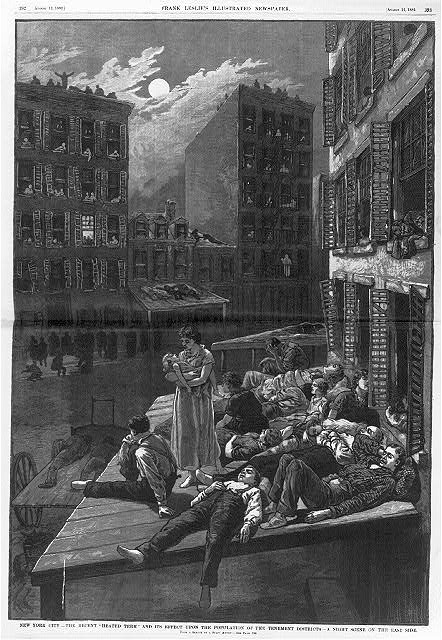
If I could I would have the kind of restriction which would not allow any immigrant to come here unless I was content that his grandchildren would be fellow-citizens of my grandchildren. They will not be so if he lives in a boarding house at $2.50 per month with ten other boarders and contracts tuberculosis and contributes to the next generation a body of citizens inferior not only morally and spiritually but also physically.”
Speech to the National Americanization Committee, February 1, 1916
This quotation from Theodore Roosevelt came only 50 years after the end of the Civil War – a war fought to end America’s original sin of African–American slavery. It echoes Abraham Lincoln’s famous quote “As I would not be a slave, so I would not be a master”. Lincoln and TR knew the temporary benefits of exploitation of an underclass weakened the nation in the long run, both morally and economically.
Yet our current lax immigration system shows we have still not learned this lesson. By failing to effectively enforce the immigration laws for the last 30 years, the federal government has created a new and perpetually renewing socioeconomic underclass. We essentially have a de facto policy of importing foreigners to perform work for wages below the likely prevailing wage for Americans and with no practical recourse for violations of basic laws governing wages and working conditions. It is a system that smacks of slavery and betrays our values as Americans.
This exploitation is not confined to low-wage blue-collar jobs. The H1B visa program has been abused by high-tech and other industries to keep the wages of IT technical workers down by bringing in cheaper workers from Asia and elsewhere and then discriminating against those workers after they are hired. This often leaves them with high student debt or other expenses and no way to pay it off without postponing for years such basic goals as a family and home ownership.
The conventional justification for this policy is that companies cannot find Americans who will work at these supposedly low class, inferior jobs. Many who make these arguments claim to be advocates of free market economics. They conveniently overlook the most basic rule of supply-and- demand economics; i.e, that while changes in personal preference can change the equilibrium point on the supply-demand curve, there is always a price at which supply will meet the demand. In short, as a Federal Reserve Board President pointed out, they can solve the problem by paying more. Instead, they believe certain jobs have an inherent value that is lower than what the market will bear and it is the government’s job to reduce their wages to this assumed inherent value. The result has made it more difficult for all workers at the lower end of the labor spectrum to climb the ladder of success and achieve the American dream.
The recent influx of Central Americans has provided a new source of laborers and a new rationalization for allowing their entry – their potential status as refugees. Advocates of refugee status for Central Americans ask us to sympathize with them because of the unrest and high murder and crime rates in those countries. Here are the 2017 homicide rates in Guatemala, Honduras and El Salvador compared to the same statistic for the deadliest American cities during the same period:
2017 US Major City Murder Rates vs. Central America (per 100,000)
- El Salvador 81.2
- St. Louis 66.1
- Honduras 59
- Baltimore 55.8
- Detroit 39.8
- New Orleans. 39.5
- Baton Rouge 38.3
- Guatemala 27.3
Sources: Pew Research Center; Council on Foreign Relations
Thus, the advocates of granting refugee status are offering to “shelter” these immigrants by settling them in a country with crime rates that are often worse than the countries they are fleeing from. Their sympathy for crime victims seems to end at the other side of the American border.
Our high national debt and urgent domestic needs means redistributive taxation cannot solve this inequity. First, the 11 million immigrants who have lived and worked in the shadows with our implicit consent need to be given legal status and an eventual opportunity for citizenship. We then must say “never again” to such exploitation by adopting strict new limits on immigration and effective enforcement mechanisms. Annual immigration limits should be enacted that are inversely related to the unemployment rate. The higher the unemployment rate, the lower the immigration limit. Employers should be required to use the E-verify system to insure their workers are here legally. Far from creating more paperwork, it simply would require companies continue to report the social security numbers of new hires as they currently do for withholding tax purposes.
The border needs to be secured, but the best way is with an adequately funded Border Patrol that has sufficient resources to interdict both illegal immigrants and drug smugglers (see this article by a retired agent about the current reality). We also need more immigration judges and facilities that are flexible enough to quickly adjudicate immigration issues.
In the end, the most effective and humane way to prevent illegal immigration is to help Mexico and our Central American neighbors control the violence and create more economic opportunity in their countries. Mexico has begged us for years to stop the exportation of American guns arming the drug gangs against the military. We should set an example of border control and do so. President Trump has failed to fund Obama Administration programs to fight violence and rebuild civil society in Central America. We should fully fund and expand those programs if we are serious about protecting their citizens and encouraging them to stay in and develop their home countries.
Ending this new slavery will not be easy. Our economy has been built on this exploitation for decades. However, end it we must if we are to be true to our values and secure an opportunity for the American Dream for all Americans.
